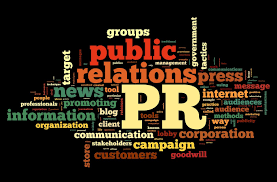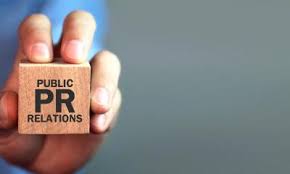Title: The Power of a PR Firm: Elevating Your Brand’s Communication Game
Introduction:
In today’s fast-paced and highly competitive business landscape, effective communication is crucial for any brand’s success. This is where a PR firm steps in, armed with the expertise and resources to strategically manage your brand’s public image. In this article, we will explore the invaluable role of a PR firm in elevating your brand’s communication game.
Building Trust and Credibility:
A reputable PR firm understands the importance of building trust and credibility for your brand. Through strategic media relations, they can secure positive coverage in relevant publications, online platforms, and broadcast media. This exposure not only increases your brand’s visibility but also enhances its reputation as an industry leader or expert.
Crafting Compelling Stories:
Storytelling lies at the heart of effective communication. A skilled PR firm knows how to identify the unique aspects of your brand and transform them into compelling narratives that resonate with your target audience. By crafting engaging stories, they can captivate the media and consumers alike, generating interest and enhancing brand loyalty.
Navigating Crisis Situations:
In times of crisis, having a PR firm by your side can make all the difference. They possess the experience and expertise to handle sensitive situations swiftly and effectively. From managing negative publicity to providing crisis communication strategies, a PR firm can help protect your brand’s reputation during challenging times.
Strategic Social Media Management:
In today’s digital age, social media plays a pivotal role in shaping public perception. A PR firm can develop comprehensive social media strategies tailored to your brand’s objectives. They understand which platforms are most suitable for reaching your target audience and how to create engaging content that sparks conversations around your brand.
Thought Leadership Development:
Establishing thought leadership within your industry positions you as an authority figure while driving credibility for your brand. A PR firm can help you identify opportunities for speaking engagements, guest articles in reputable publications, and participation in industry events. By positioning your brand as a thought leader, you can attract new clients and retain existing ones.
Monitoring and Analysis:
In the ever-evolving world of communication, staying informed is crucial. A PR firm employs advanced tools and technologies to monitor media coverage, social media trends, and industry developments. This allows them to provide valuable insights into your brand’s performance, identify emerging opportunities, and make data-driven decisions to optimize your communication strategies.
Conclusion:
A PR firm acts as a strategic partner in elevating your brand’s communication game. From building trust and credibility to navigating crises and harnessing the power of social media, their expertise can help shape public perception while driving business growth. By investing in a reputable PR firm, you are ensuring that your brand’s message reaches the right audience at the right time, ultimately setting you apart from the competition. Embrace the power of a PR firm today and unlock the full potential of your brand’s communication strategy.
7 Essential Tips for Choosing and Maximizing the Value of a PR Firm
- Research potential PR firms to ensure they have the right experience and expertise for your business.
- Make sure you understand what services the PR firm offers and how it will help to meet your objectives.
- Establish a clear budget for the services of the PR firm and ensure that you are getting value for money.
- Agree on measurable goals with your PR firm so that you can track progress and results against these metrics.
- Ensure that there is good communication between you and your PR firm, with regular updates on progress being provided in a timely manner.
- Take advantage of any additional services offered by the PR firm such as media training, crisis management or social media management to maximise their value to your organisation.
- Monitor any press coverage generated by the PR firm to assess its effectiveness in achieving your goals and objectives
Research potential PR firms to ensure they have the right experience and expertise for your business.
Title: Choosing the Right PR Firm: The Key to Effective Communication
Introduction:
When it comes to enhancing your brand’s communication strategy, partnering with a reputable PR firm can be a game-changer. However, not all PR firms are created equal. To ensure you make the right choice for your business, conducting thorough research is essential. In this article, we will explore the importance of researching potential PR firms to ensure they possess the necessary experience and expertise to meet your specific needs.
Understanding Your Business:
Every business is unique, with its own set of goals, target audience, and industry dynamics. Researching potential PR firms allows you to assess whether they have experience working within your industry or with businesses similar to yours. This understanding ensures that the firm is well-versed in your specific challenges and can provide tailored strategies that align with your objectives.
Assessing Track Record and Reputation:
A reputable PR firm will have a proven track record of success. By researching their past clients and campaigns, you can gauge their ability to deliver results. Look for case studies or testimonials that highlight their achievements in areas such as media relations, crisis management, social media management, or thought leadership development. Additionally, consider seeking recommendations from trusted sources within your industry.
Expertise in Targeted Communication Channels:
Effective communication relies on understanding which channels are most relevant for reaching your target audience. Researching potential PR firms allows you to evaluate their expertise in various communication channels such as traditional media outlets, online platforms, social media networks, or influencer marketing. Ensure that the firm has a strong grasp of these channels and can develop strategies that resonate with your audience.
Personal Chemistry and Compatibility:
Collaboration is key when working with a PR firm. During the research phase, take the time to speak with representatives from each potential firm. Assess their level of enthusiasm for your business and whether they truly understand your vision and goals. A good fit in terms of personal chemistry and compatibility will foster a strong working relationship, leading to more effective communication strategies.
Budget Considerations:
Researching potential PR firms also allows you to evaluate their pricing structure and determine if it aligns with your budget. While cost should not be the sole determining factor, it is essential to find a balance between quality and affordability. Request detailed proposals from each firm, outlining the services they offer and the associated costs. This will help you make an informed decision based on your financial capabilities.
Conclusion:
Researching potential PR firms is a crucial step towards finding the right partner for your business’s communication needs. By assessing their experience, track record, expertise, personal compatibility, and pricing structure, you can ensure that you choose a PR firm that aligns with your goals and can deliver impactful results. Investing time in this research phase will set the foundation for a successful partnership that elevates your brand’s communication strategy and helps you stand out in today’s competitive marketplace.
Make sure you understand what services the PR firm offers and how it will help to meet your objectives.
When it comes to hiring a PR firm, one of the key tips to keep in mind is to thoroughly understand the services they offer and how they align with your specific objectives. A successful partnership with a PR firm relies on clear communication and shared goals.
Firstly, take the time to research and familiarize yourself with the range of services provided by the PR firm. Do they specialize in media relations, crisis management, social media strategy, or all of the above? Understanding their expertise will help you determine if their offerings align with your communication needs.
Next, consider how these services will directly contribute to meeting your objectives. Are you looking to increase brand awareness, launch a new product, enhance your reputation, or manage a crisis? Clearly defining your objectives beforehand will enable you to evaluate whether the PR firm’s services are tailored to meet those goals.
It is also important to have open and transparent communication with the PR firm regarding your expectations. Clearly articulate what you hope to achieve and discuss how their services can support those objectives. A reputable PR firm will be able to provide insights and suggestions based on their experience and expertise.
Additionally, ask for examples or case studies of previous work that demonstrate how the PR firm has helped clients achieve similar goals. This will give you a better understanding of their capabilities and track record.
Remember that effective collaboration between your team and the PR firm is essential for success. Establishing regular communication channels and maintaining an open dialogue throughout the partnership will ensure that both parties are aligned in terms of expectations and deliverables.
In conclusion, when engaging a PR firm, it is crucial to have a clear understanding of their services and how they can help you meet your objectives. By doing thorough research, clearly defining your goals, and maintaining open communication throughout the partnership, you can maximize the value of working with a PR firm that is best suited for your specific needs.
Establish a clear budget for the services of the PR firm and ensure that you are getting value for money.
Title: Maximizing ROI: Setting a Clear Budget for Your PR Firm
Introduction:
When it comes to engaging the services of a PR firm, one crucial aspect that should not be overlooked is establishing a clear budget. By doing so, you can ensure that you are getting the best value for your money and maximizing your return on investment (ROI). In this article, we will explore the importance of setting a budget for your PR firm’s services and how it can help you achieve your communication goals effectively.
Defining Your Objectives:
Before allocating a budget, it is essential to define your communication objectives. Are you looking to increase brand awareness, launch a new product, or manage a crisis? Understanding your goals will allow you to allocate resources more effectively and determine the scope of work required from your PR firm.
Researching Market Rates:
To ensure that you are getting value for money, it’s important to research market rates for PR services. This will give you an idea of what to expect in terms of pricing and help you negotiate with potential PR firms. Keep in mind that while price is important, it should not be the sole deciding factor. Consider the firm’s expertise, track record, and reputation alongside their pricing structure.
Tailoring Services to Your Budget:
Once you have established your budget range, communicate this clearly with potential PR firms during the selection process. A reputable PR firm will work with you to tailor their services within your budget constraints while still delivering quality results. They can help prioritize activities based on their impact and align them with your available resources.
Monitoring Performance and ROI:
Setting a budget also allows you to monitor the performance and ROI of your PR efforts more effectively. By tracking key metrics such as media coverage, website traffic, lead generation, or social media engagement, you can assess whether the investment in your chosen PR firm is generating tangible results. Regularly reviewing these metrics will help determine if adjustments need to be made to optimize your budget allocation.
Open Communication and Accountability:
Establishing a clear budget fosters open communication and accountability between you and your PR firm. It allows for transparent discussions about resource allocation, potential limitations, and the expected outcomes within the agreed-upon budget. This ensures that both parties are aligned in their expectations and can work together towards achieving the desired communication goals.
Conclusion:
Setting a clear budget for the services of your PR firm is a crucial step in ensuring that you are getting value for money and maximizing your ROI. By defining your objectives, researching market rates, tailoring services to fit within your budget, monitoring performance, and fostering open communication, you can effectively manage your resources while achieving impactful results. Remember, investing in a reputable PR firm is an investment in the growth and success of your brand’s communication strategy.
Agree on measurable goals with your PR firm so that you can track progress and results against these metrics.
Title: Setting Measurable Goals: Maximizing Results with Your PR Firm
In the dynamic world of public relations, setting clear and measurable goals is essential for achieving success. When partnering with a PR firm, it is crucial to establish these goals from the outset. By agreeing on measurable objectives, you can effectively track progress and evaluate results against specific metrics. In this article, we will explore the importance of setting measurable goals with your PR firm and how it can maximize your communication efforts.
Defining Success:
Setting measurable goals allows you to define what success looks like for your brand’s PR efforts. It provides a clear roadmap for both you and your PR firm to work towards a common objective. Whether it’s increasing brand awareness, driving website traffic, generating media coverage, or enhancing social media engagement, defining measurable goals ensures that everyone is aligned and working towards the same outcome.
Tracking Progress:
By establishing specific metrics tied to your goals, you can track progress throughout your PR campaign. Regular updates from your PR firm will help you understand how various tactics are performing and whether adjustments are needed along the way. This real-time feedback allows for agile decision-making and ensures that resources are allocated effectively to maximize results.
Demonstrating ROI:
Measurable goals enable you to assess the return on investment (ROI) of your PR efforts accurately. By tracking key performance indicators (KPIs) such as media mentions, website traffic, lead generation, or social media engagement, you can measure the impact of your PR campaigns in tangible terms. This data-driven approach provides valuable insights into the effectiveness of different strategies and tactics employed by your PR firm.
Enhancing Accountability:
When both parties agree upon measurable goals at the start of a partnership, it establishes a sense of accountability for all involved. Clear objectives create a framework against which progress can be evaluated objectively. This fosters transparency between you and your PR firm and ensures that everyone is working towards achieving the desired outcomes.
Optimizing Strategies:
Measurable goals provide valuable feedback that can be used to refine and optimize your PR strategies. If certain tactics are not delivering the expected results, you and your PR firm can collaborate to make data-driven adjustments. This iterative approach allows for continuous improvement, ensuring that your PR efforts are aligned with your overall business objectives.
In conclusion, setting measurable goals with your PR firm is a fundamental aspect of maximizing results and achieving success in your communication efforts. By clearly defining objectives, tracking progress, demonstrating ROI, enhancing accountability, and optimizing strategies, you can ensure that your partnership with the PR firm is focused on driving tangible outcomes for your brand. Embrace this tip to harness the full potential of your PR campaigns and elevate your brand’s communication game.
Ensure that there is good communication between you and your PR firm, with regular updates on progress being provided in a timely manner.
Effective Communication: The Key to Success with Your PR Firm
When it comes to working with a PR firm, one of the most crucial aspects of a successful partnership is good communication. Open lines of communication and regular updates on progress are essential for achieving your brand’s communication goals in a timely manner. Here’s why ensuring good communication with your PR firm is vital.
First and foremost, regular updates from your PR firm keep you informed about the progress of your campaigns and initiatives. By staying in the loop, you can have a clear understanding of the strategies being implemented and the results being achieved. This transparency allows you to provide feedback, make necessary adjustments, or offer additional insights that can further enhance the effectiveness of your PR efforts.
Moreover, timely updates ensure that both you and your PR firm are on the same page throughout the process. By receiving regular reports or scheduled meetings, you can discuss any concerns or questions that may arise promptly. This helps to address any potential issues before they escalate, allowing for smoother collaboration and more efficient campaign execution.
Good communication also fosters trust and strengthens the relationship between you and your PR firm. When there is open dialogue and regular updates, it demonstrates that both parties are invested in achieving shared goals. Trust is built upon this foundation of effective communication, enabling you to work together more seamlessly as partners rather than mere service providers.
In addition to progress updates, good communication allows for brainstorming sessions and idea sharing. Your insights as a brand owner or representative are invaluable in shaping effective PR strategies. Regular discussions with your PR firm provide an opportunity to exchange ideas, explore new angles, and align on messaging that best represents your brand’s values and objectives.
To ensure good communication with your PR firm:
- Establish clear expectations from the start: Clearly communicate your goals, objectives, target audience, and desired outcomes so that everyone is aligned from the beginning.
- Set up regular check-ins: Schedule periodic meetings or calls to discuss progress, address any concerns, and provide updates on both sides.
- Foster an open and collaborative environment: Encourage your PR firm to share insights, ideas, and suggestions. Actively listen to their expertise while providing your own perspectives.
- Provide timely feedback: If you have any feedback or suggestions, communicate them promptly to ensure that adjustments can be made in a timely manner.
Remember, effective communication is a two-way street. Be responsive and available to your PR firm’s inquiries or requests for information. By maintaining good communication practices throughout your partnership, you can maximize the success of your PR campaigns and achieve your brand’s communication goals with confidence.
Title: Maximizing the Value of Your PR Firm: Embrace Additional Services for Optimal Results
Introduction:
When partnering with a PR firm, it’s essential to make the most of their expertise and resources to achieve your organization’s communication goals. Beyond their core services, many PR firms offer additional services such as media training, crisis management, and social media management. In this article, we will explore the importance of taking advantage of these supplementary offerings to maximize the value provided by your PR firm.
Media Training: Enhancing Your Spokesperson’s Skills
One valuable service offered by PR firms is media training. This specialized training equips your spokesperson or key executives with the skills and confidence needed to effectively communicate with journalists and deliver key messages. By mastering interview techniques, understanding media dynamics, and learning how to handle challenging questions, your team can seize media opportunities and present your brand in the best possible light.
Crisis Management: Navigating Turbulent Times
No organization is immune to crises. When faced with a challenging situation that threatens your brand’s reputation, having a PR firm that offers crisis management services becomes invaluable. These experts can help you develop comprehensive crisis communication strategies, establish protocols for handling emergencies, and guide you through turbulent times while minimizing negative impact. By proactively preparing for potential crises alongside your PR firm, you can protect your brand’s image and swiftly recover from any setbacks.
Social Media Management: Harnessing Digital Influence
In today’s digital age, social media has become a powerful tool for communication and brand building. Many PR firms now offer social media management services to help you navigate this complex landscape effectively. They can devise tailored strategies to strengthen your online presence on platforms relevant to your target audience. From content creation and community management to monitoring trends and engaging with followers, leveraging these additional services ensures that your brand remains visible and connected in the digital realm.
Maximizing Value through Integration
By utilizing these additional services offered by your PR firm, you can create a seamless and integrated approach to your organization’s communication efforts. When media training, crisis management, and social media management are aligned with your overall PR strategy, the impact is amplified. This integration allows for consistent messaging across various channels, enhances brand perception, and maximizes the value derived from your partnership with the PR firm.
Conclusion:
To fully capitalize on the value provided by your PR firm, it is crucial to embrace any additional services they offer. Media training empowers your team to effectively engage with journalists and deliver key messages. Crisis management ensures that you are well-prepared to handle unforeseen challenges while protecting your brand’s reputation. Social media management helps you harness the power of digital platforms to connect with your audience. By integrating these supplementary services into your overall communication strategy, you can unlock the full potential of your partnership with the PR firm and achieve optimal results for your organization.
Monitor any press coverage generated by the PR firm to assess its effectiveness in achieving your goals and objectives
Monitoring Press Coverage: Assessing the Effectiveness of Your PR Firm
When partnering with a PR firm, it’s essential to evaluate the impact of their efforts in achieving your goals and objectives. One effective way to gauge their effectiveness is by monitoring the press coverage generated through their initiatives.
Press coverage serves as a valuable indicator of how well your brand’s message is being conveyed to the public. By tracking media mentions, interviews, articles, and features secured by your PR firm, you can assess the reach and quality of your brand’s exposure.
Firstly, monitoring press coverage allows you to measure the extent of your brand’s visibility. Are you appearing in relevant publications or media outlets? Are these platforms reaching your target audience? Analyzing the breadth and depth of media coverage helps determine whether your PR firm is successfully positioning your brand in front of key stakeholders.
Secondly, evaluating press coverage provides insights into the tone and sentiment surrounding your brand. Positive coverage reinforces a favorable perception among consumers, while negative or neutral coverage may require further attention. By understanding how media outlets are portraying your brand, you can work with your PR firm to address any misconceptions or enhance positive narratives.
Furthermore, assessing press coverage enables you to identify gaps or missed opportunities in media exposure. Are there specific industry publications or influential journalists that have not yet covered your brand? By recognizing these gaps, you can collaborate with your PR firm to develop targeted strategies that maximize exposure within those areas.
Tracking press coverage also helps determine whether the messaging aligns with your goals and objectives. Is the core message effectively communicated? Does it resonate with your target audience? Analyzing media mentions allows you to assess whether the key messages emphasized by your PR firm are being accurately portrayed in the media landscape.
Lastly, monitoring press coverage facilitates ongoing evaluation of your PR firm’s performance. Are they consistently delivering on their promises? Are they proactive in securing media opportunities for your brand? Regularly reviewing press coverage allows you to have informed discussions and provide constructive feedback to your PR firm, ensuring a productive working relationship.
In conclusion, monitoring press coverage is a valuable practice in assessing the effectiveness of your PR firm. By evaluating the reach, sentiment, messaging alignment, and overall performance of media coverage, you can make data-driven decisions to optimize your PR strategies. Remember, effective communication is key to achieving your goals and objectives, and monitoring press coverage serves as an essential tool in this process.






